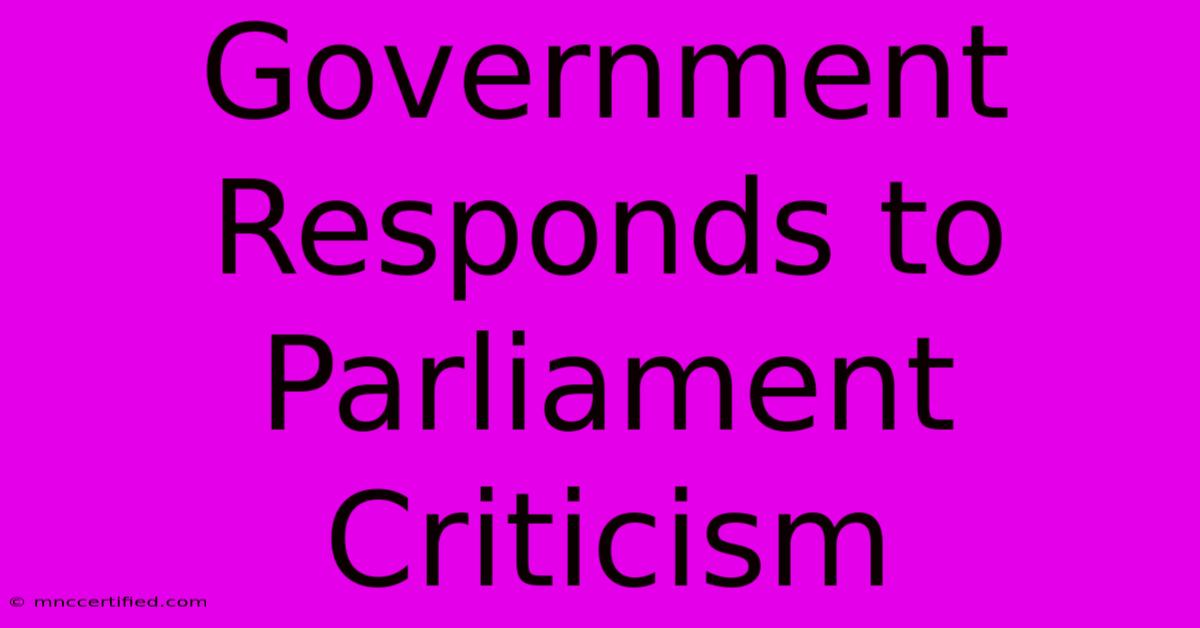Government Responds To Parliament Criticism

Table of Contents
Government Responds to Parliament Criticism: A Deep Dive into Accountability and Public Discourse
Governments worldwide face constant scrutiny from their respective parliaments. This parliamentary oversight is a cornerstone of democracy, ensuring accountability and transparency. However, when criticism arises, the government's response is crucial, shaping public perception and influencing future policy. This article delves into the intricacies of government responses to parliamentary criticism, examining various strategies, their effectiveness, and the wider implications for public trust.
Understanding the Nature of Parliamentary Criticism
Parliamentary criticism can range from mild concerns to fierce condemnation, encompassing various issues like:
- Policy failures: Critiques of ineffective or poorly implemented policies are common, often focusing on areas like healthcare, education, or economic management. Examples include debates on rising inflation, insufficient infrastructure spending, or healthcare system inefficiencies.
- Financial mismanagement: Allegations of corruption, wasteful spending, or lack of transparency in government finances often draw sharp criticism. The handling of public funds is under constant parliamentary scrutiny.
- Ethical breaches: Accusations of misconduct by government officials, including ministers or other high-ranking personnel, can trigger intense parliamentary debate and demand robust responses.
- Legislative shortcomings: Criticisms may focus on the inadequacies of proposed or existing legislation, highlighting loopholes, unintended consequences, or lack of consultation.
The severity and nature of the criticism significantly influence the government's response strategy.
Government Response Strategies: A Spectrum of Approaches
Governments employ various strategies to address parliamentary criticism, each with its own strengths and weaknesses:
1. Direct Refutation and Defense:
This involves directly addressing the criticisms, providing evidence to counter accusations, and justifying the government's actions. Strong data, transparent communication, and a calm, measured tone are crucial for this approach to be effective. Failure to provide concrete evidence can damage credibility.
2. Acknowledgement and Apology:
Acknowledging the validity of certain criticisms and offering apologies, particularly in cases of genuine errors or misconduct, can demonstrate accountability and earn public trust. This approach, however, requires careful consideration, as admitting fault might have political ramifications.
3. Promise of Action and Reform:
Committing to investigate the issues, implement reforms, or initiate policy changes can be a powerful response, showing a willingness to address concerns proactively. However, failure to deliver on these promises can erode public trust even further.
4. Dismissal and Deflection:
Dismissing criticism as unfounded or politically motivated can be risky. While sometimes necessary, this strategy should be used judiciously, as it risks alienating the public and appearing unresponsive. Effective deflection requires skillful argumentation and a focus on highlighting the positive aspects of government policy.
5. Investigation and Inquiry:
Launching independent investigations or inquiries into the matters raised can demonstrate a commitment to transparency and accountability. This approach allows for objective assessment and can build public confidence in the government's commitment to rectifying any wrongdoing.
The Impact of Public Perception and Media Coverage
The government's response, and how it's perceived by the public and reported by the media, heavily impacts its legitimacy and future prospects. Negative media coverage can amplify criticism, potentially leading to a loss of public support. Effective communication with the media is therefore crucial in shaping the narrative around the government's response.
Conclusion: Transparency and Accountability as Cornerstones of Effective Governance
The way a government responds to parliamentary criticism is a critical indicator of its commitment to transparency and accountability. While defending its actions is necessary, a balanced approach acknowledging valid concerns and demonstrating a willingness to address shortcomings is essential for maintaining public trust and ensuring effective governance. Open communication, prompt action, and a commitment to continuous improvement are key to navigating the challenges posed by parliamentary scrutiny. The long-term success of any government hinges on its ability to effectively manage public discourse and address legitimate concerns raised by its elected representatives.

Thank you for visiting our website wich cover about Government Responds To Parliament Criticism. We hope the information provided has been useful to you. Feel free to contact us if you have any questions or need further assistance. See you next time and dont miss to bookmark.
Featured Posts
-
Aleppo Airport Rebels Seize Control
Dec 01, 2024
-
Aleppo Under Rebel Control
Dec 01, 2024
-
Farrells Ireland Beats Australia
Dec 01, 2024
-
Sian Welby Encourages Dont Be Scared
Dec 01, 2024
-
Survivor Series 2024 War Games Match Results
Dec 01, 2024